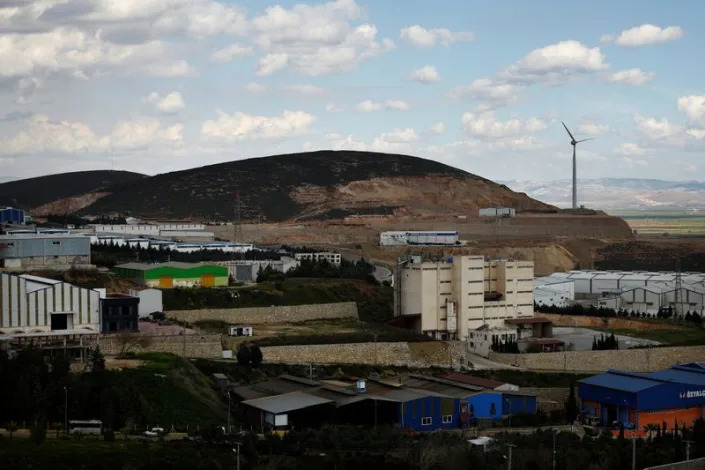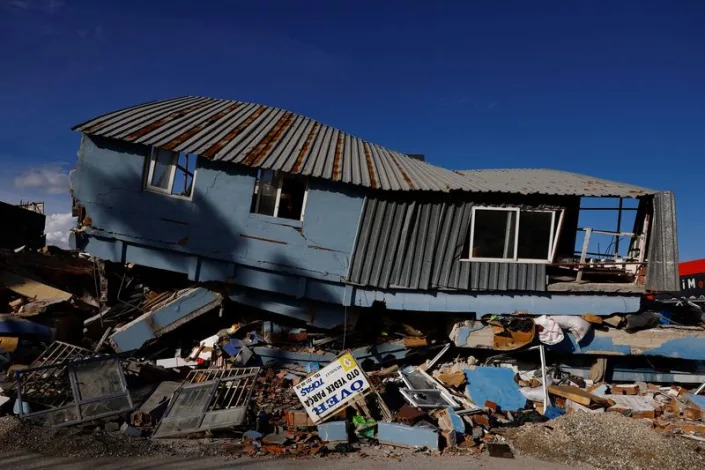
Wind turbines stand on a field in Budy Mszczonowskie, Poland, Monday, Feb. 21, 2022.
Poland’s lawmakers have approved a new law relaxing the rules for installation of onshore wind turbines, a move that has been expected by the European Union which is holding up recovery funds for the nation over a number of legislative issues.
(AP Photo/Czarek Sokolowski, File)
Fri, March 10, 2023
WARSAW, Poland (AP) —
Poland’s lawmakers have approved a new law relaxing the rules for installation of onshore wind turbines, a move that was urged by the European Union, which is holding up recovery funds for the nation over a number of legislative issues.
The law approved by the lower house, the Sejm, late Thursday allows for turbines to be built no less than 700 meters (765 yards) from houses — less restrictive than the previous rule of 10 times the turbine’s height that was introduced by the current government in 2016.
That restriction practically stalled wind energy development in coal-reliant Poland as no suitable location could be found, and the 27-member EU has called on Poland to relax the rules.
The vote was 231-209 with two abstentions. Almost all of the supporting votes came from the ruling coalition.
Initially, the minimum new distance was planned at 500 meters, but was raised to 700 meters almost at the last moment, due to disputes inside the ruling coalition, which in general does not favor wind energy. The conservative government that took office in 2015 put a halt to wind farms arguing that was in the interest of local people, who were concerned that the turbines would bring noise, ground vibrations and other discomfort to them.
By contrast, the government has been supporting solar energy and subsidizing solar panels for households, as well as planning significant offshore wind farms in the Baltic Sea. It is also supporting Poland's coal mining, a major employer in the southern Silesia region.
Climate and Environment Minister Anna Moskwa said on Twitter the new law “strengthens Poland's energy security” as it “increases the power coming from renewable sources” while respecting the views of local communities.
The law, which still needs approval from the Senate and from President Andrzej Duda, gives local residents more say as to turbines' location and also gives them a share in the energy produced.
But critics say the liberalization is insufficient and is still limiting the number of potential locations and the amount of power that could be obtained from wind, thus failing to help bring soaring energy prices down. They argue that renewable energy should get all the backing it needs at the time when Russia's war on Ukraine has reduced energy deliveries from Russia.
Creating conditions for wind energy growth is among a number of milestones that Brussels is expecting Warsaw to meet before billions of euros of pandemic recovery funds can be disbursed to the country. Other key milestones include improving Poland's rule of law record and relaxing rules for disciplining judges.
Fri, March 10, 2023
WARSAW, Poland (AP) —
Poland’s lawmakers have approved a new law relaxing the rules for installation of onshore wind turbines, a move that was urged by the European Union, which is holding up recovery funds for the nation over a number of legislative issues.
The law approved by the lower house, the Sejm, late Thursday allows for turbines to be built no less than 700 meters (765 yards) from houses — less restrictive than the previous rule of 10 times the turbine’s height that was introduced by the current government in 2016.
That restriction practically stalled wind energy development in coal-reliant Poland as no suitable location could be found, and the 27-member EU has called on Poland to relax the rules.
The vote was 231-209 with two abstentions. Almost all of the supporting votes came from the ruling coalition.
Initially, the minimum new distance was planned at 500 meters, but was raised to 700 meters almost at the last moment, due to disputes inside the ruling coalition, which in general does not favor wind energy. The conservative government that took office in 2015 put a halt to wind farms arguing that was in the interest of local people, who were concerned that the turbines would bring noise, ground vibrations and other discomfort to them.
By contrast, the government has been supporting solar energy and subsidizing solar panels for households, as well as planning significant offshore wind farms in the Baltic Sea. It is also supporting Poland's coal mining, a major employer in the southern Silesia region.
Climate and Environment Minister Anna Moskwa said on Twitter the new law “strengthens Poland's energy security” as it “increases the power coming from renewable sources” while respecting the views of local communities.
The law, which still needs approval from the Senate and from President Andrzej Duda, gives local residents more say as to turbines' location and also gives them a share in the energy produced.
But critics say the liberalization is insufficient and is still limiting the number of potential locations and the amount of power that could be obtained from wind, thus failing to help bring soaring energy prices down. They argue that renewable energy should get all the backing it needs at the time when Russia's war on Ukraine has reduced energy deliveries from Russia.
Creating conditions for wind energy growth is among a number of milestones that Brussels is expecting Warsaw to meet before billions of euros of pandemic recovery funds can be disbursed to the country. Other key milestones include improving Poland's rule of law record and relaxing rules for disciplining judges.




















